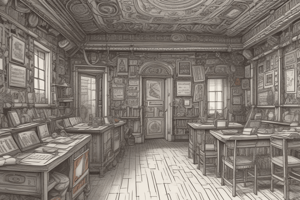Podcast
Questions and Answers
A ______________ clause is a complete sentence that has a subject and a predicate.
A ______________ clause is a complete sentence that has a subject and a predicate.
independent
The ______________ tense is used to describe an action that will be completed at a point in the future.
The ______________ tense is used to describe an action that will be completed at a point in the future.
future perfect
A ______________ is a word that is added to the beginning of a root word to change its meaning.
A ______________ is a word that is added to the beginning of a root word to change its meaning.
prefix
The ______________ stage of the writing process involves generating ideas and topics.
The ______________ stage of the writing process involves generating ideas and topics.
A ______________ is a word that has the same pronunciation as another word, but a different meaning.
A ______________ is a word that has the same pronunciation as another word, but a different meaning.
In an essay, the __________ sentence summarizes the main idea.
In an essay, the __________ sentence summarizes the main idea.
A type of poem with a specific rhyme scheme and 14 lines is called a __________.
A type of poem with a specific rhyme scheme and 14 lines is called a __________.
The literary device that compares two things without using 'like' or 'as' is a __________.
The literary device that compares two things without using 'like' or 'as' is a __________.
In poetry, a group of lines is called a __________.
In poetry, a group of lines is called a __________.
A type of poem that has no specific rhyme or meter is called __________ Verse.
A type of poem that has no specific rhyme or meter is called __________ Verse.
Flashcards are hidden until you start studying
Study Notes
Grammar
- Parts of Speech:
- Nouns: person, place, thing, or idea
- Verbs: action or state of being
- Adjectives: modify nouns or pronouns
- Adverbs: modify verbs, adjectives, or other adverbs
- Pronouns: replace nouns
- Prepositions: show relationship between words
- Conjunctions: connect words or phrases
- Interjections: express emotion
- Tenses:
- Present: current action
- Past: completed action
- Future: future action
- Past Perfect: action before another action
- Future Perfect: action before another action in the future
- Clause Types:
- Independent: complete sentence
- Dependent: cannot stand alone as a sentence
Vocabulary
- Word Formation:
- Prefix: added to beginning of word
- Suffix: added to end of word
- Root Word: core meaning of word
- Word Types:
- Homophones: words with same pronunciation
- Homographs: words with same spelling
- Synonyms: words with similar meaning
- Antonyms: words with opposite meaning
- Context Clues:
- Definition: explicit meaning
- Inference: implied meaning
- Example: illustration of word use
- Contrast: comparison to opposite meaning
Composition
- Writing Process:
- Brainstorming: generate ideas
- Outlining: organize ideas
- Drafting: write initial composition
- Revising: review and improve
- Editing: correct errors
- Publishing: finalize composition
- Essay Types:
- Narrative: tell a story
- Descriptive: describe a person, place, or thing
- Expository: explain or describe
- Persuasive: convince or persuade
- Paragraph Structure:
- Topic Sentence: main idea
- Body Sentences: supporting details
- Concluding Sentence: summarize main idea
Poetry
- Poetic Devices:
- Metaphor: comparison without "like" or "as"
- Simile: comparison with "like" or "as"
- Alliteration: repetition of initial consonant sound
- Imagery: language that appeals to senses
- Poem Types:
- Sonnet: 14-line poem with specific rhyme scheme
- Haiku: 3-line poem with nature theme
- Free Verse: no specific rhyme or meter
- Poetic Forms:
- Stanzas: groups of lines
- Lines: individual rows of words
- Enjambment: sentence or phrase continuing to next line without punctuation
Studying That Suits You
Use AI to generate personalized quizzes and flashcards to suit your learning preferences.




